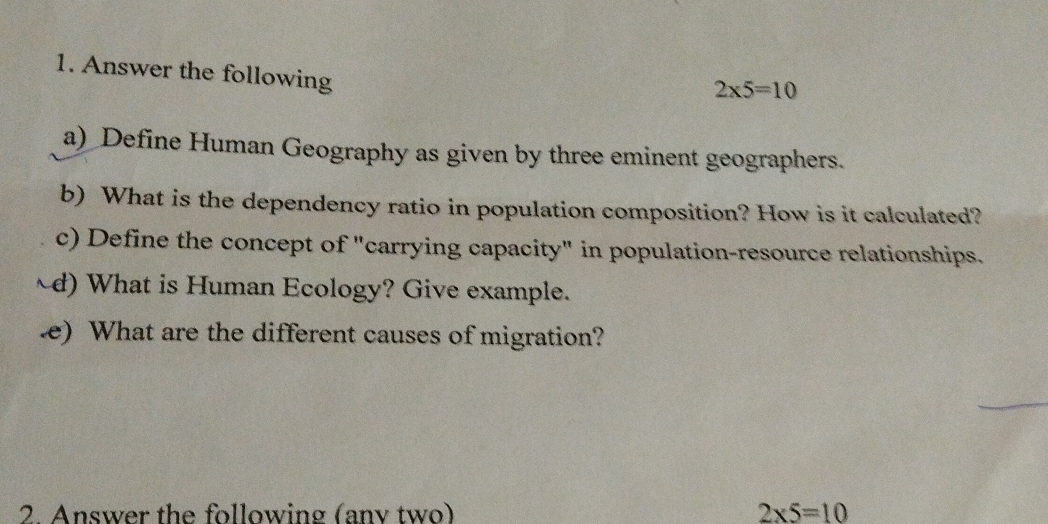Define Human Geography as given by three eminent geographers. What is the dependency ratio in population composition? How is it calculated? Define the concept of 'carrying capacity... Define Human Geography as given by three eminent geographers. What is the dependency ratio in population composition? How is it calculated? Define the concept of 'carrying capacity' in population-resource relationships. What is Human Ecology? Give an example. What are the different causes of migration?

Understand the Problem
The question is asking for definitions and explanations of various concepts within the field of geography, specifically human geography, population studies, and ecology. It requires a detailed understanding of each concept mentioned.
Answer
Definitions and methods provided for human geography, dependency ratio, carrying capacity, human ecology, and migration causes.
a) Human Geography, as defined by notable geographers, is the study of how humans interact with their physical environment and organize space and society. b) The dependency ratio is the ratio of dependents (aged 0-14 and over 65) to the working-age population (15-64). It is calculated as: (Number of dependents / Working-age population) * 100. c) Carrying capacity refers to the maximum population level that can be supported indefinitely given available resources (e.g., food, water, habitat). d) Human Ecology studies the relationship between humans and their natural, social, and built environments. Example: Studying how urbanization affects ecosystem services. e) Causes of migration include economic opportunities, political conflict, environmental factors, and social or cultural reasons.
Answer for screen readers
a) Human Geography, as defined by notable geographers, is the study of how humans interact with their physical environment and organize space and society. b) The dependency ratio is the ratio of dependents (aged 0-14 and over 65) to the working-age population (15-64). It is calculated as: (Number of dependents / Working-age population) * 100. c) Carrying capacity refers to the maximum population level that can be supported indefinitely given available resources (e.g., food, water, habitat). d) Human Ecology studies the relationship between humans and their natural, social, and built environments. Example: Studying how urbanization affects ecosystem services. e) Causes of migration include economic opportunities, political conflict, environmental factors, and social or cultural reasons.
More Information
Human geography links human activity and the physical environment. Dependency ratio affects economic health and planning. Carrying capacity is crucial for sustainability. Human ecology demonstrates the interconnectedness of humans and nature.
Tips
Confusing dependency ratio with total population; ensure you only use dependents and working age. Overlooking non-economic causes of migration.
Sources
- Population and Migration – Introduction to Human Geography - slcc.pressbooks.pub
- AP Human Geography : Implications of Density & Distribution - varsitytutors.com
AI-generated content may contain errors. Please verify critical information